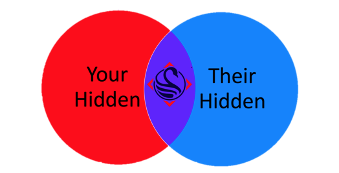In general if someone refers to something as being a black swan they’re referencing it as a completely unexpected or unpredictable but extremely high-impact event.
Similarly, according to the Black Swan Group, “Black Swans” are the small things that change everything and give you something better. They’re found in two places: the overlap and the unknown. Here’s how you can uncover them.
Finding Black Swans: The Overlap
One place you’ll find Black Swans is in the overlap.
It’s a hard thing to bend your mind around. But if you’re holding back key pieces of information such as deadlines, priorities, recent pressures, and developments, which—you are—well ... so are they.
What happens in the overlap? Magic. Black Swans are solid gold, game-changing value-producing discoveries.

You can speculate. But any way you slice it, you don’t know for sure which recent competitor has them worried, what their boss has been demanding, what supplier has failed them, what internal disagreement they’ve recently had, and so on.
Only they can tell you. No matter how much research you do, there are things that only your counterpart is in the position to know.
As Brandon Voss says “If you haven’t uncovered 3-5 new pieces of information in each negotiation, you’ve failed.”
Finding Black Swans: The Unknown
As for the second place to find Black Swans? It’s where the other side has information they’re not sharing because they have no idea it’s important!
Because they don’t know what you’re holding back, how could they know what they know is important?
And this is the shortcoming of looking for tells. For the other side to exhibit a “tell” (i.e., an indicator of deception), they have to know that the information matters. What if they don’t have any idea it matters?
At least 50 percent of the Black Swans that exist are things the other side has no idea are important.
Uncovering Black Swans with Targeted Mirrors
Using the right tools—such as mirrors and labels—makes the job of finding Black Swans more manageable.
Here’s what you’re looking for: body language shifts, any words that trigger your curiosity, double-speak, professional jargon, and the like. This is the time to be especially fearless about digging into terminology that may sound like clichés or some sort of verbal shorthand.
Mirroring is a great skill that’s fun to practice. Make Mondays “Mirror Day” just for the fun of it.
Instead of saying, I understand, mirror the other side by repeating the last few words they’ve said, using a downward-inflecting voice and then going silent. When they say, That’s the best I can do, you say The best you can do ... and let the silence get uncomfortable.
Mirror to inquire. Instead of saying, What did you mean by that? when something about what the other side said either catches you off guard, seems critical, or somehow trips up your gut instinct, use a mirror and reflect their words back at them.
When mirroring to inquire, use the upward inflection of genuine inquiry. This isn’t accusatory or incredulous. Genuine curiosity is the tone.
And how do you build the gut instinct to know what to mirror? Practice.
Get your reps (repetitions) in. Small-stakes practice, like testing your skills on your barista, sets you up for high-stakes success.
Uncovering Black Swans with Targeted Labels
Labels: Verbal observations of dynamics and emotions.
Labels can help you, too. You seem ... You sound ... You look ... It seems ... It sounds ... It looks ... It feels ...
One of our superstar clients says he always labels body language shifts. Target those when you notice them.
It seems like that ... struck a chord with you.
It seems like that ... triggered a thought?
It seems like that ... caught you off guard?
It seems like there’s more here ... than meets the eye?
It seems like that made you feel ... uncomfortable?
The ... here represents the use of a one-second-long effective pause mid-label, followed by the term you choose for your label delivered with an upward inflection (signaling genuine curiosity).
As with your mirrors, dynamic silence should follow your use of this skill.
Be prepared to mirror the response to your label. Labels and mirrors make a great one-two punch.
Bottom line? Practice, practice practice. You’ll find the Black Swans soon enough!


